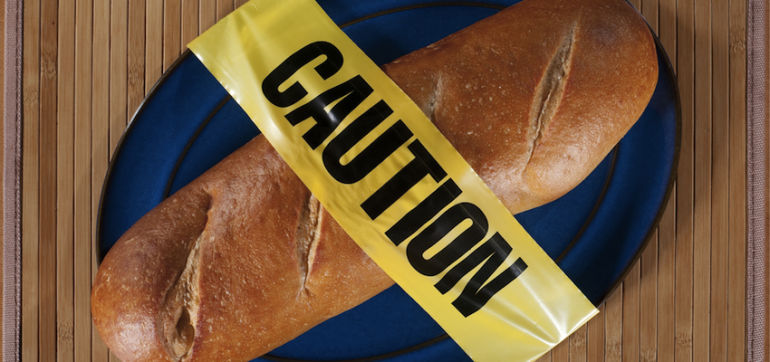Ulcerative colitis symptoms: Weight loss due to loss of appetite and other factors
 Weight loss is quite common in ulcerative colitis, either due to loss of appetite or other factors. A type of inflammatory bowel disease (IBD), ulcerative colitis is often accompanied by painful flare-ups, so choosing the right foods to eat is often quite difficult.
Weight loss is quite common in ulcerative colitis, either due to loss of appetite or other factors. A type of inflammatory bowel disease (IBD), ulcerative colitis is often accompanied by painful flare-ups, so choosing the right foods to eat is often quite difficult.
Food plays a large role in ulcerative colitis because it can trigger a flare-up. Out of fear of feeling sick, some patients may avoid eating, cut down on their eating, or even lose their appetite altogether. All of these factors can result in unintended weight loss in ulcerative colitis patients.
Like many IBDs, ulcerative colitis may impact each person differently, so what may affect one patient may go unnoticed in the other. Although patients with ulcerative colitis may experience a host of differing symptoms, common ones include blood stools, bathroom urgency, loose stools, abdominal pain, worsening symptoms, inflammation, remission periods, and weight loss.
Ulcerative colitis and weight loss
Diarrhea, abdominal pain, and loss of appetite associated with ulcerative colitis can all contribute to unintentional weight loss, making it challenging to maintain weight. The problem is, they may look thinner, but they are often feeling weak and tired because of losing weight.
In fact, many patients may experience body dysmorphia as a result of the drastic weight loss that sometimes occurs. A 2015 study suggested that many IBD patients experience body dissatisfaction, which can have a negative impact on their quality of life. The risk of body dissatisfaction was highest among females and those who had a more severe case of IBD.
Weight loss in ulcerative colitis may be difficult to prevent and, unfortunately, there isn’t a one-size-fits-all solution. You may have to try a few different things – medical treatments and natural remedies – to help you manage your weight even during a flare-up. Working closely with your doctor and dietician may help ease the stress related to weight loss in ulcerative colitis.
Diet-based natural remedies for ulcerative colitis
 Diet can play a large role in the treatment of ulcerative colitis. Although there is no solid evidence that certain eating habits can cause bowel disease, it is a fact that certain foods can aggravate your condition or cause symptoms to flare up.
Diet can play a large role in the treatment of ulcerative colitis. Although there is no solid evidence that certain eating habits can cause bowel disease, it is a fact that certain foods can aggravate your condition or cause symptoms to flare up.
There are common foods that have been found to cause problems in ulcerative colitis, but in order to know your specific food triggers, you should keep a food diary to log your meals and document how you felt during and after eating.
Here are some foods to limit or avoid if you have ulcerative colitis:
- Limit your dairy intake or try using a digestive enzyme to break down lactose if you’re lactose intolerant.
- Try eating low-fat foods. Foods higher in fat are more difficult to break down and can cause your digestive system more stress. Furthermore, any damage on your intestines may make it difficult to absorb fat, so it simply passes through your system, contributing to diarrhea.
- Limit fiber-rich foods, as these may be difficult to digest. If possible, cook them for easier digestion.
- Avoid other problem foods such as alcohol, caffeine, and spice, which can worsen the symptoms.
- Some other dietary recommendations include eating smaller meals, staying well hydrated, considering multivitamins, and talking to a dietician.
Other lifestyle changes for ulcerative colitis
Along with dietary changes, there are lifestyle changes that can help improve your ulcerative colitis. For example, stress has been found to trigger or worsen ulcerative colitis symptoms, so it’s important that you reduce your anxieties as much as possible. Some effective ways to combat stress are exercise, biofeedback, and regular relaxation and breathing techniques.
-
Endocarditis, inflammation of endocardium can damage your heart valves
There are many illnesses and conditions that can plague the he
-
Outsourcing Your Weight Loss
Outsourcing your weight loss, now that would be the ultimate time and
-
Go From Obese To Lean With The Right Combination
This is not a joke, a piece of equipment, nor a magic diet… the
-
Are You Motivated To Lose Weight?
So you want to lose weight. That’s good, but are you serious?
-
4 Reasons Your Diet Isnt Working + What To Do About It
-
Effective and Proven Ways to Lose Body Fat
As we grow older, we tend to put on weig
- DON'T MISS
- Lose Weight Fastest
- Weight-loss drug review
- Green Tea: The Weight Loss Drink Miracle
- Weight Loss Problem? Simple tips to lose weight
- 5 Ways To Make Sure Your Workout Is Helping You Lose Weight
- 5 Quick And Easy Weight Loss Tips That Anyone Can Do
- Truth about Abs Review – Where Are the Bad Reviews?
- 6 Foods That Naturally Suppress Your Appetite!
- The 10 Commandments Of Weight Loss Success
- Adopting Healthy Eating Habits




